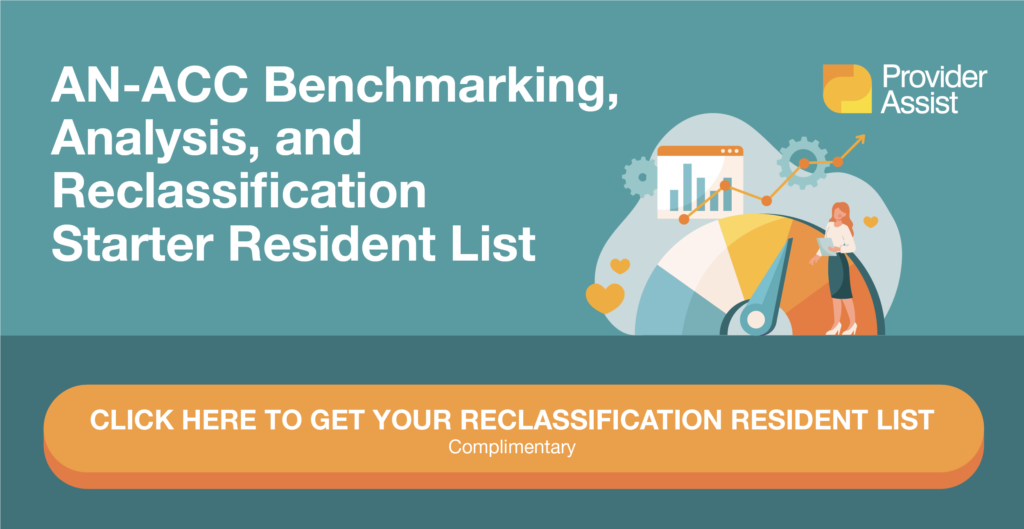Whether you’re missing out on funding or you’ve been surprised Residents have been downgraded at Reclassification, the biggest mistakes we’re seeing are:
- Assuming the AN-ACC Assessor will do all the assessments for you
- Not preparing for the visit
It’s a huge misconception that under AN-ACC, assessments are no longer required or critical to ensure you’re well-funded for the care you’re delivering; or that the AN-ACC Assessors will do all that’s required – that’s not their role. Providers are becoming increasingly aware of the amount of work and skill required to manage AN-ACC.
Getting AN-ACC correct requires the management of many different moving parts. AN-ACC Assessors visit your site to:
- Review Clinical Documentation
- Interview Staff and Residents
- Observe Care Activities
They use this information to complete the AN-ACC tools. They have approximately 1 hour per Resident and because there are many different agencies offering AN-ACC assessment services, approaches are inconsistent. We’ve heard of Assessors only reviewing documentation, others only want to interview care staff and not talk to Registered Nurses or Clinical Managers. So, this means you need to be prepared for all approaches by ensuring:
- Assessment, documentation, care planning and care delivery is rooted in strong, proactive needs-based comprehensive assessment
- Your whole clinical picture from assessment to care planning to care delivery is congruent
- Your staff deeply understand assessed need and the AN-ACC tools so they can make better and more aligned decisions daily, and articulate that to the Assessors
- Residents & families understand their care and it meets their goals and preferences.
It all needs to be congruent so there are no contradictions, and so that if the Assessor looks at one thing and not the other, they get the same picture no matter where they look.
This AN-ACC transition is a big educational and organisational change for your Facilities and team. If done correctly, this pre-AN-ACC implementation Reclassification period can be used not only to ensure you’re receiving the correct AN-ACC funding for the care you’re delivering, but also to identify and close gaps in your processes, skills, team and so on, that will result in missed funding in the future.
Our Approach to Reclassification
Resident Identification
- Start by looking at Residents who are funded lower under AN-ACC than they were under ACFI (we can easily prepare this for you – complimentary – just email team@providerassist.com.au)
- Overlay the AN-ACC Reclassification Triggers (be aware new triggers were released recently https://providerassist.com.au/news-resources/new-reclassification-triggers-finally-information-on-compounding-factors-available/)
- Review the Clinical picture of the Resident and determine if the AN-ACC Classification is appropriate.
Getting Ready for Reclassification visits:
- Proactive comprehensive needs-based assessment: Update all required assessments, documentation and care plans using an assessed need approach
- Documentation supports the AN-ACC Tools: The AN-ACC Assessor only has 1 hour for each Resident. Make it easy for them to find what they need.
- Congruency: Ensure the entire clinical picture for the Resident is congruent by auditing documentation, interviewing Residents and staff
- Close any gaps you’ve identified: Through updating documentation, staff education on AN-ACC, what might happen at a visit, or assessed-need based care delivery or even on Resident care understanding and acceptance.
This video of Majorie’s story may help alleviate some of the tension between risk, care needs and dignity and choice and help make your AN-ACC Classification visit more successful.
After the visit:
- Use the results to show you what’s working and not working in your Facility. Are the actual classifications received consistent with your expectations?
- Where they are not – re-conduct the congruency audit from above. Which part caused the problem?
- Identify the gaps and use that as the basis for education before your next Assessor visit.
Given every organisation is still learning and building AN-ACC capabilities, this incremental learning approach is critical.

Mathew Brincat
General Manager - Clinical & Quality




